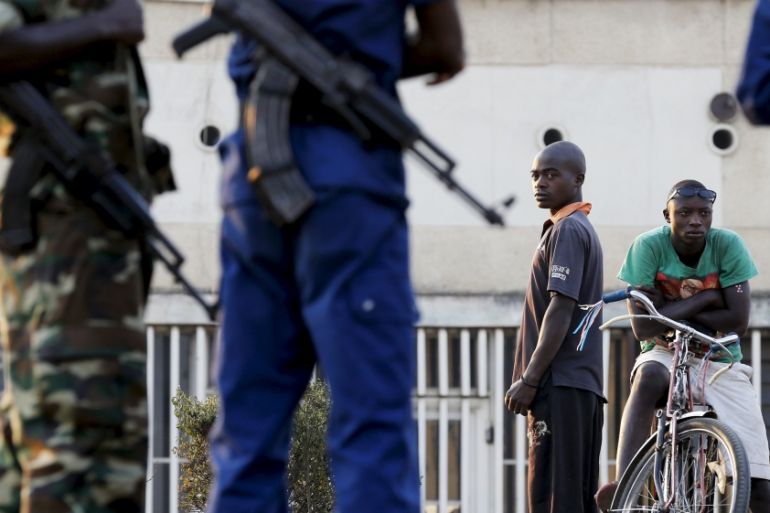Burundi using ‘violence’ against opposition ahead of polls: HRW
Security forces and governing party using violence with near-total impunity ahead of May polls, rights group says.

Burundi’s government is using fear and repression against the opposition as the central African country heads to the polls next month, Human Rights Watch (HRW) said on Monday.
The rights group accused local authorities, security forces and members of the governing party’s youth league, the Imbonerakure, of using violence as campaigning for the May 20 election started on Monday.
Keep reading
list of 3 itemsBurundi to give outgoing presidents luxury villa, over $500,000
Burundi becomes first country to leave ICC
“Violence and repression have been the hallmark of politics in Burundi since 2015, and as elections approach and the COVID-19 pandemic unfolds, tensions are rising,” Lewis Mudge, Central Africa director at HRW, said.
“There is little doubt that these elections will be accompanied by more abuses, as Burundian officials and members of the Imbonerakure are using violence with near-total impunity to allow the ruling party to entrench its hold on power,” he added.
HRW said they spoke to more than 20 people, including victims, witnesses, civil society groups, police, and governing party sources, who described abuses in six of the country’s 18 provinces.
The rights group said they documented killings, disappearances, arbitrary arrests, and threats and harassment against real or perceived political opponents over the last six months.
In 2015, President Pierre Nkurunziza’s controversial decision to seek a third term plunged the country into its worst crisis since the end of a bloody civil war about 10 years earlier, with rights groups saying hundreds of people were killed in a crackdown by the security agencies on protesters in the months that followed the president’s re-election.
Nkurunziza, who came to office in 2005, announced in June last year that he will not seek re-election.
The 55-year-old was widely expected to take advantage of recent constitutional changes adopted by a referendum to stand for re-election, raising concerns that Burundi would see a repeat of the deadly unrest that erupted after he controversially stood for the third time in 2015.
In January, the governing CNDD-FDD party said its secretary-general Evariste Ndayishimiye will be its candidate in the country’s presidential election.
An ally of Nkurunziza, 52-year-old Ndayishimiye also heads the department of military affairs in the president’s office and has served as the minister of interior and security.
Meanwhile, in February, the main opposition party, National Congress for Liberty, known by its French acronym CNL, picked 56-year-old Agathon Rwasa as its candidate.
A former rebel leader and longtime political opponent of Nkurunziza, Rwasa was the leading opposition candidate in two previous elections in 2010 and 2015 – but boycotted both of them.